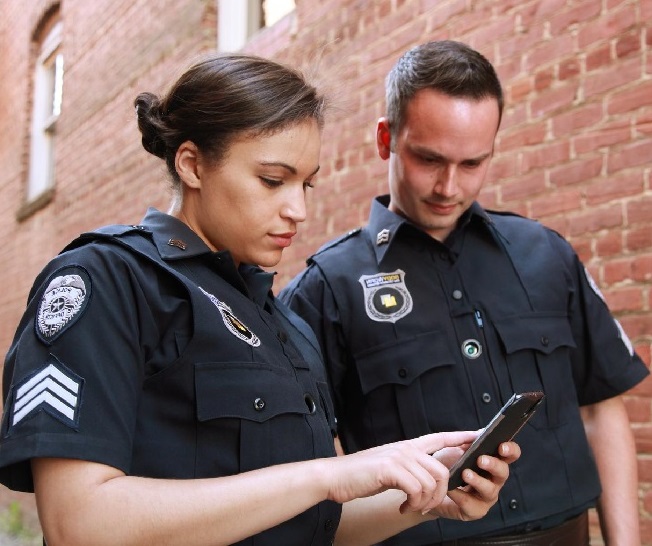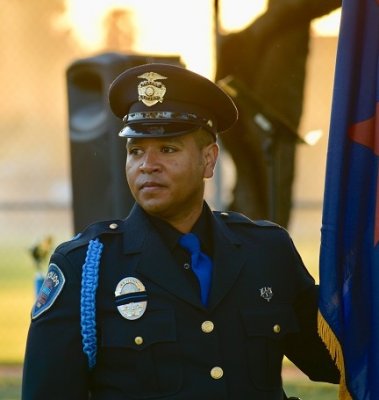Custom Training to Meet the Needs of Your
Academy, Precinct, or Station
It is time to incorporate robust critical thinking into your law enforcement agency at this revolutionary time in our history, in which a more humane approach to law enforcement will be increasingly required. We are aware of the various discussions focused on de-escalating violent situations involving law enforcement interactions. However, revolutionizing how law enforcement agencies operate is not simple, since changing the way law enforcement officers think is not simple. It is only by incorporating mandatory fairminded critical thinking courses/programs into law enforcement training across the board that we can bring about the long-term permanent change needed to deal with the crisis at hand, and to move into a more compassionate and charitable future.
Our fellows and facilitators can lead onsite workshops for your law enforcement agency, and we are happy to put together a proposal for online short courses on critical thinking for your police officers and leaders (based on your circumstances and setting). Your law enforcement agency, using training in explicit fairminded critical thinking, can become a model for law enforcement agencies and police academies across the nation.
{"id":"4680","title":"","author":"","content":"<p><span style=\"font-size: large;\">It is time to incorporate robust critical thinking into your law enforcement agency at this revolutionary time in our history, in which a more humane approach to law enforcement will be increasingly required. We are aware of the various discussions focused on de-escalating violent situations involving law enforcement interactions. However, revolutionizing how law enforcement agencies operate is not simple, since changing the way law enforcement officers think is not simple. It is only by incorporating mandatory fairminded critical thinking courses/programs into law enforcement training across the board that we can bring about the long-term permanent change needed to deal with the crisis at hand, and to move into a more compassionate and charitable future.<br /><br />Our fellows and facilitators can lead onsite workshops for your law enforcement agency, and we are happy to put together a proposal for online short courses on critical thinking for your police officers and leaders (based on your circumstances and setting). Your law enforcement agency, using training in explicit fairminded critical thinking, can become a model for law enforcement agencies and police academies across the nation.</span></p>","public_access":"1","public_downloads":"0","sku":"","files":[],"images":[]}
 Equip Your Recruits and Officers with the Paul-Elder Framework for Critical Thinking
Equip Your Recruits and Officers with the Paul-Elder Framework for Critical Thinking
The Only Critical Thinking Approach Explicitly Used in the U.S. Military and Intelligence Communities A Robust Conception of Critical Thinking Developed Over Decades
Accounts for Emotions, Desires, and Ethics
Universally Applicable
We applaud the law enforcement leadership we are seeing at this time, as some step forward to advance improvement in law enforcement agencies.  However, unless and until fairminded explicit critical thinking is placed at the center of this discussion, we cannot expect long-term or significant change.
However, unless and until fairminded explicit critical thinking is placed at the center of this discussion, we cannot expect long-term or significant change.
One of our fellows can discuss the possibilities for training your law enforcement officers and leaders, either on-site or online, depending on what seems best to address immediate needs and given current resources. We have worked with many law enforcement officers through our 40-year history, at our conferences and academies, from the US and abroad.
At this unprecedented time in history, let your agency take the lead in advancing fairminded, disciplined reasoning in the police force.
{"id":"4683","title":"","author":"","content":"<p style=\"text-align: left;\"><span style=\"font-size: large;\">We applaud the law enforcement leadership we are seeing at this time, as some step forward to advance improvement in law enforcement agencies. </span><span style=\"font-size: large;\"><img style=\"float: right; margin-left: 10px; margin-top: 10px; margin-bottom: 10px;\" src=\"https://www.criticalthinking.org/data/courses/Officer_with_Child_2.jpg\" alt=\"\" width=\"175\" height=\"261\" /></span><span style=\"font-size: large;\">However, unless and until fairminded explicit critical thinking is placed at the center of this discussion, we cannot expect long-term or significant change.</span><br /><br /><span style=\"font-size: large;\">One of our fellows can discuss the possibilities for training your law enforcement officers and leaders, either on-site or online, depending on what seems best to address immediate needs and given current resources. We have worked with many law enforcement officers through our 40-year history, at our conferences and academies, from the US and abroad.</span><br /><br /><span style=\"font-size: large;\">At this unprecedented time in history, let your agency take the lead in advancing fairminded, disciplined reasoning in the police force.</span></p>","public_access":"1","public_downloads":"0","sku":"","files":[],"images":[]}
Recruits, Officers, and Leaders in Our Online Courses and On-Site Training Programs Will:
1. Learn to think within multiple viewpoints to fully understand those viewpoints; to change their thinking when someone else's reasoning is better, and when new information and the situation require it.
 2. Improve their ability to reason fairmindedly through the many complex problems they face as police officers.
2. Improve their ability to reason fairmindedly through the many complex problems they face as police officers.
3. Be introduced to the importance of cultivating ethical virtues in their own minds - virtues such as empathy, integrity, honesty, forthrightness, intellectual autonomy, and confidence in reason.
4. Learn to take their thinking apart so they can routinely identify faulty assumptions and ideas in their thinking that lead to poor judgments.
5. Learn the criteria by which they should make judgments in all police encounters and situations. This includes objectivity, impartiality, and fairness.
6. Learn the barriers to critical thinking all police officers face, as do all humans – namely, egocentric and sociocentric thinking.
7. Learn to think through implications and consequences of their actions before acting.
{"id":"4679","title":"","author":"","content":"<p><span style=\"font-size: large;\"><strong>Recruits, Officers, and Leaders in Our Online Courses and On-Site Training Programs Will: </strong></span></p>\r\n<p><span style=\"font-size: large;\">1. Learn to think within multiple viewpoints to fully understand those viewpoints; to change their thinking when someone else's reasoning is better, and when new information and the situation require it. </span><br /> <br /><span style=\"font-size: large;\"> <img style=\"float: right; margin-top: 7px; margin-bottom: 11px; margin-left: 10px;\" src=\"https://www.criticalthinking.org/data/courses/Officer_2.jpg\" alt=\"\" width=\"350\" height=\"369\" />2. Improve their ability to reason fairmindedly through the many complex problems they face as police officers. </span><br /> <br /><span style=\"font-size: large;\"> 3. Be introduced to the importance of cultivating ethical virtues in their own minds - virtues such as empathy, integrity, honesty, forthrightness, intellectual autonomy, and confidence in reason. </span><br /> <br /><span style=\"font-size: large;\"> 4. Learn to take their thinking apart so they can routinely identify faulty assumptions and ideas in their thinking that lead to poor judgments. </span><br /> <br /><span style=\"font-size: large;\"> 5. Learn the criteria by which they should make judgments in all police encounters and situations. This includes objectivity, impartiality, and fairness. </span><br /> <br /><span style=\"font-size: large;\"> 6. Learn the barriers to critical thinking all police officers face, as do all humans – namely, egocentric and sociocentric thinking. </span><br /> <br /></p>\r\n<div><span style=\"font-size: large;\"> 7. Learn to think through implications and consequences of their actions before acting. </span></div>","public_access":"1","public_downloads":"0","sku":"","files":[],"images":[]}
 Equip Your Recruits and Officers with the Paul-Elder Framework for Critical Thinking
Equip Your Recruits and Officers with the Paul-Elder Framework for Critical Thinking  However, unless and until fairminded explicit critical thinking is placed at the center of this discussion, we cannot expect long-term or significant change.
However, unless and until fairminded explicit critical thinking is placed at the center of this discussion, we cannot expect long-term or significant change. 2. Improve their ability to reason fairmindedly through the many complex problems they face as police officers.
2. Improve their ability to reason fairmindedly through the many complex problems they face as police officers. 